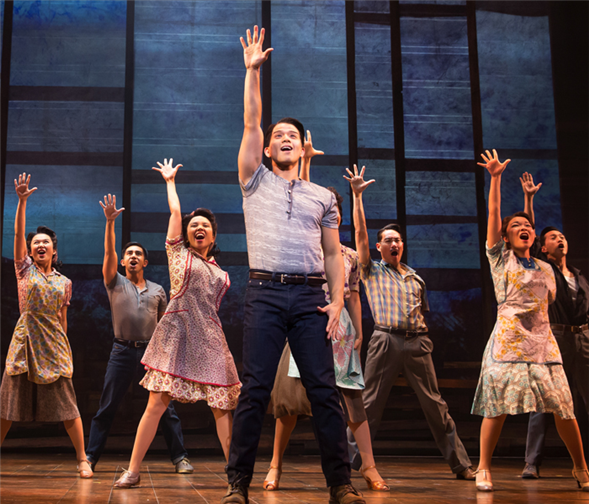Translate Page

Why playwright Marc Acito is committed to inspiring stories
---
"For me, theatre is church. I go as a broken, troubled person seeking to be shown a way to live better."
So says Marc Acito, the playwright and librettist who is currently making his Broawday debut with Allegiance, a musical about America's Japanese internment camps during World War II. Just like the rest of his projects, his work on that show is guided by his vision of the theatre's purpose. "I'm a mission-driven writer," he says. "I'm committed to telling truthful stories that uplift and inspire."
It's striking for an artist to be that blunt about his desire to spread joy. After all, Acito notes, the cultural set often seems to prefer a harsher worldview: "What it means to be a 'serious artist' has been redefined as being a pessimist. And pessimism has its place, because it makes you skeptical and it makes you question. But just because I'm committed to joy, don't try to say that that somehow makes me a lightweight. The word I especially bristle at is 'sentimentality,' because to me that's a word that people who are afraid to feel use to shame those who aren't."
A buoyant philosophy is on display in Allegiance, which Acito joined as co-book writer several years into its development. Though it certainly depicts the horror Japanese-Americans faced when they were thrown into camps by a government that assumed they were aligned with the enemy, it also contains several scenes of the inmates carrying on with their lives. Inside their prison, there are dances and gardens and romance, and some of these happier moments are paired with upbeat songs.
As startling as these elements might seem in a musical about a shameful chapter in the nation's history, Acito says they're essential to the show. "The joy and hope in Allegiance are authentic. We didn't dole them out because we were saying, 'Oh God, we're doing it on Broadway, so we'd better have a happy number!' We did it because that is the experience of the people."
For instance, he continues, "When I found out that the Japanese-Americans [in the camps] not only got crops to grow in infertile, hard soil, but were so successful that they then donated to the American military – that, to me, was the story right there. The grace of rewarding your captors with your own bounty speaks volumes to me. To focus only on the hardship is not to tell the whole story."
Acito also sees a similar, dogged optimism in George Takei, who co-stars in Allegiance and whose own childhood experience in a camp partially inspired the plot. "This is a man who can condemn the frightening rhetoric around the Syrian refugees and then post a Grumpy Cat meme," Acito says. "That's just where he lives. If the man whose government put him in a prison camp at gun point at the age of five can have a sense of humor, then what's our excuse?"
And so Acito, who began his career as a journalist and the author of the successful theatre-geek novel How I Paid for College, continues writing with his mission in mind. He has over half a dozen projects in development, including a musical about Judy Garland's life and a play about Albert Einstein's friendship with the singer Marian Anderson. He feels compelled to write as much as he can while he still has the ability to write it.
"I'm going to be 50 next year, and what motivates me, frankly, is a looming sense of mortality," he says. "It was the death of my mother that inspired me to move to New York and make a mid-career change to writing for the theatre. I'm burning daylight, and I'm in a rush to get my message out there."
---
Follow Mark Blankenship at @IAmBlankenship. Follow TDF at @TDFNYC.